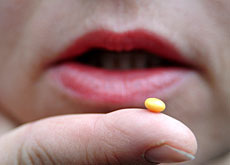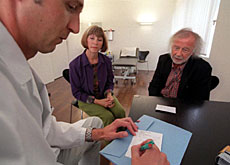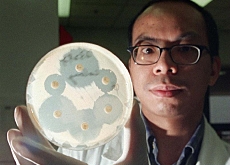More people misuse antibiotics

The Swiss are more aware of antibiotic resistance than ever before – but the incorrect use of antibiotics is on the rise, according to a survey.
The gfs.bern institute found that 64 per cent of the population had heard of antibiotic resistance, with 85 per cent citing unnecessary intake and improper use as major causes.
However, 11 per cent admitted not respecting the label instructions when taking antibiotics themselves.
This was the second time that the survey, which was released on Tuesday, had been carried out. It was commissioned by the National Research Programme on antibiotic resistance.
During the first survey in 2003, only four per cent owned up to not taking the medicine properly.
Lukas Golder, project leader at gfs.bern said fears were likely to account for the change – the more people were concerned by antibiotic resistance, the more likely they were to respect usage guidance.
“The emotional contingent of the subject has dropped since 2003, which has led to more people not taking antibiotics properly,” Golder said in a statement.
Ticino
Residents of Italian-speaking canton Ticino topped the charts of those in Switzerland not adhering to label instructions.
Around 34 per cent admitted to doing so, compared with 12 per cent in German-speaking Switzerland and four per cent in the French-speaking part.
But the president of the antibiotic resistance research programme, Jean-Claude Piffaretti, told swissinfo that it was important not to overdramatise these particular results.
“Switzerland has the lowest consumption of antibiotics in Europe,” Piffaretti said.
According to Swiss research published in 2006, France was at the top of the list of consumers in 2002, with just over 30 defined daily doses (DDD) per 1,000 inhabitants per day.
In Switzerland the DDD for the same period was slightly under ten.
Piffaretti added that the problem of false usage was an internal issue within Switzerland, which could be boiled down to cultural differences.
“In Ticino, there is a different perception of antibiotic resistance. My opinion is that in German-speaking Switzerland, people are much more sensitive to these issues,” he suggested.
More action
Piffaretti called for more campaigns to alert the Swiss public to antibiotic resistance and its associated problems.
“Pharmacies and doctors should be involved; better cooperation is needed,” he said.
For its part, the Federal Health Office is not planning a special campaign to raise awareness of the dangers of antibiotics.
“We will increase our pandemic controls and cooperate closely with doctors associations,” Karim Boubaker told swissinfo.
According to the United States Centers for Disease Control and Prevention, antibiotic resistance occurs when bacteria change in a way that reduces or eliminates the effectiveness of antibiotics.
Resistant bacteria survive and multiply, causing more harm in some cases.
swissinfo, Faryal Mirza
A total of SFr12 million ($9.4 million) was made available over five years for the national antibiotic resistance research project.
The research phase began on July 1, 2001 with work in 21 research groups.
The projects were grouped thematically:
Human and animal health, surveillance and environment;
Molecular biology;
Society, economics and law

In compliance with the JTI standards
More: SWI swissinfo.ch certified by the Journalism Trust Initiative


You can find an overview of ongoing debates with our journalists here. Please join us!
If you want to start a conversation about a topic raised in this article or want to report factual errors, email us at english@swissinfo.ch.